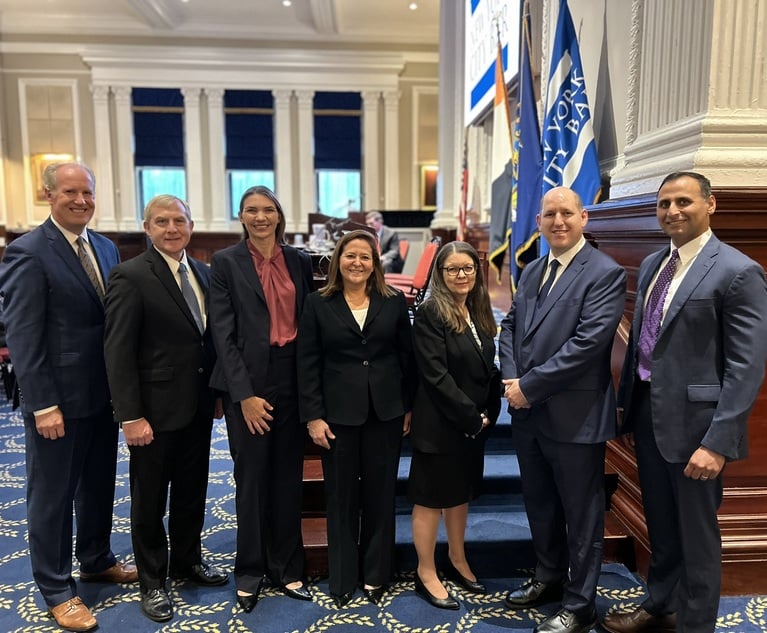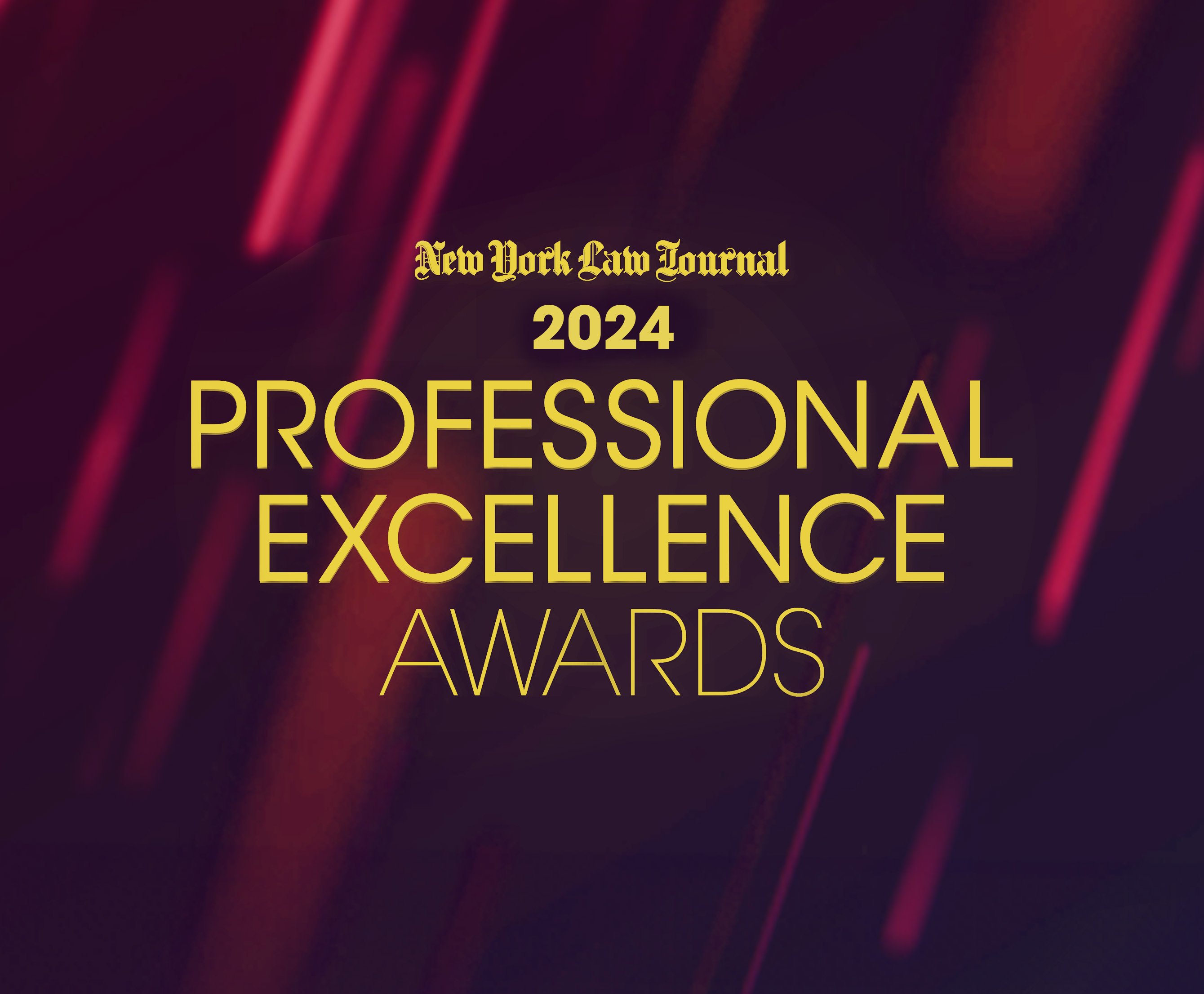 From left, Theodore Wells Jr., partner and co-chair of the litigation department, Brad Karp, chairman of the firm, Jacqueline Rubin, partner, Robert Atkins, partner and co-chair of the litigation department, and Daniel Kramer, partner (Photograph by Todd France)
From left, Theodore Wells Jr., partner and co-chair of the litigation department, Brad Karp, chairman of the firm, Jacqueline Rubin, partner, Robert Atkins, partner and co-chair of the litigation department, and Daniel Kramer, partner (Photograph by Todd France)Litigation Department of the Year, Class Action: Paul, Weiss, Rifkind, Wharton & Garrison
Our record of achievement is unparalleled in terms of our successful defense of "bet the company" class action litigations and clients facing franchise-threatening risks.
October 16, 2019 at 11:09 AM
4 minute read
What are some of the department's most satisfying successes of the past year and why? We recently resolved, on favorable terms, several major cases that we've handled for a decade or more. In May 2018, after more than a decade of securities litigation on behalf of Merck concerning the drug Vytorin, we secured the final dismissal of high-value, "opt out" claims, having previously helped Merck settle the underlying securities class action. In March 2019, we ended two decades of litigation by defeating an antitrust and false advertising lawsuit brought by Retractable Technologies against our client Becton, Dickinson on Retractable's second trip to the Fifth Circuit. In April 2019, Italy's Supreme Court ruled that a court award we had secured for our client Citigroup in 2011 on our counterclaim against failed Italian dairy giant Parmalat was final and enforceable in Italy. Now Citi can finally collect on the judgment, which has now tripled in value and is worth over $1 billion. And in June 2019, we won the dismissal of Alien Tort Statute claims alleging that our client ExxonMobil was complicit in human rights violations committed by Indonesian soldiers. This ended 18 years of litigation. All of these outcomes were very gratifying for us and for our clients.
A prospective client in crisis calls and asks why your team should be retained. What is your answer? Paul, Weiss has the talent and experience to successfully handle the most formidable opponents, in unfriendly jurisdictions and on expedited timetables. Our record of achievement is unparalleled in terms of our successful defense of "bet the company" class action litigations and clients facing franchise-threatening risks. We have unmatched experience in the class action realm, as trial lawyers and as appellate lawyers—and in the regulatory and white-collar sphere, if that skill set is required. We truly are a unique resource for clients in crisis.
What traits do you respect most in opposing firms and lawyers? I admire the same traits in opposing counsel that I admire most in my colleagues: judgment, judgment, judgment. At the end of the day, we are in the judgment business. We need to provide our clients wise, thoughtful, strategic advice, always keeping in mind their business objectives and understanding the big picture. It is also critical that counsel be zealous advocates, strategic thinkers, effective negotiators, and have high IQ and EQ.
What sorts of trends are you seeing in litigation, and what do you think will be the most important development in the law/legal business that will impact your field in the next 10 years? Technology, especially the looming impact of AI, is increasingly disrupting litigation. Machine learning is increasingly replacing human capital, and this phenomenon will only accelerate. At Paul, Weiss, we are adjusting our staffing model to take these changes into account. We are constantly learning, investing and innovating so that our clients have every conceivable advantage.
What is the firm doing to ensure that future generations of litigators are ready to take the helm? We continually reinvest in the next generation. We provide our litigation associates opportunities to develop the skills and experience they need to become well-rounded litigators. They acquire hands-on experience not just via paid client work but through immersing themselves in pro bono cases. We supplement that experiential component with intensive formal training and skills-based workshops to gain hands-on experience in core advocacy skills. Additionally, through formal and informal coaching, we encourage our younger litigators to take on successively greater client-facing and internal leadership responsibilities so that they develop the confidence to become leaders.
Responses prepared by Brad S. Karp, chairman of Paul, Weiss, Rifkind, Wharton & Garrison.
This content has been archived. It is available through our partners, LexisNexis® and Bloomberg Law.
To view this content, please continue to their sites.
Not a Lexis Subscriber?
Subscribe Now
Not a Bloomberg Law Subscriber?
Subscribe Now
NOT FOR REPRINT
© 2024 ALM Global, LLC, All Rights Reserved. Request academic re-use from www.copyright.com. All other uses, submit a request to [email protected]. For more information visit Asset & Logo Licensing.
You Might Like
View All
For Paul Weiss, Progress Means 'Embracing the Uncomfortable Reality'
5 minute read
Kenneth Feinberg Had Dreams of Being on the Big Screen. His 9/11 Victims Fund Gave Him an Unexpected Star Turn

City Bar Holds 32nd Annual Henry L. Stimson Medal Presentation

The 2024 Winners of the Law Journal's Professional Excellence Awards
Trending Stories
- 1As 'Red Hot' 2024 for Legal Industry Comes to Close, Leaders Reflect and Share Expectations for Next Year
- 2Call for Nominations: Elite Trial Lawyers 2025
- 3Senate Judiciary Dems Release Report on Supreme Court Ethics
- 4Senate Confirms Last 2 of Biden's California Judicial Nominees
- 5Morrison & Foerster Doles Out Year-End and Special Bonuses, Raises Base Compensation for Associates
Who Got The Work
Michael G. Bongiorno, Andrew Scott Dulberg and Elizabeth E. Driscoll from Wilmer Cutler Pickering Hale and Dorr have stepped in to represent Symbotic Inc., an A.I.-enabled technology platform that focuses on increasing supply chain efficiency, and other defendants in a pending shareholder derivative lawsuit. The case, filed Oct. 2 in Massachusetts District Court by the Brown Law Firm on behalf of Stephen Austen, accuses certain officers and directors of misleading investors in regard to Symbotic's potential for margin growth by failing to disclose that the company was not equipped to timely deploy its systems or manage expenses through project delays. The case, assigned to U.S. District Judge Nathaniel M. Gorton, is 1:24-cv-12522, Austen v. Cohen et al.
Who Got The Work
Edmund Polubinski and Marie Killmond of Davis Polk & Wardwell have entered appearances for data platform software development company MongoDB and other defendants in a pending shareholder derivative lawsuit. The action, filed Oct. 7 in New York Southern District Court by the Brown Law Firm, accuses the company's directors and/or officers of falsely expressing confidence in the company’s restructuring of its sales incentive plan and downplaying the severity of decreases in its upfront commitments. The case is 1:24-cv-07594, Roy v. Ittycheria et al.
Who Got The Work
Amy O. Bruchs and Kurt F. Ellison of Michael Best & Friedrich have entered appearances for Epic Systems Corp. in a pending employment discrimination lawsuit. The suit was filed Sept. 7 in Wisconsin Western District Court by Levine Eisberner LLC and Siri & Glimstad on behalf of a project manager who claims that he was wrongfully terminated after applying for a religious exemption to the defendant's COVID-19 vaccine mandate. The case, assigned to U.S. Magistrate Judge Anita Marie Boor, is 3:24-cv-00630, Secker, Nathan v. Epic Systems Corporation.
Who Got The Work
David X. Sullivan, Thomas J. Finn and Gregory A. Hall from McCarter & English have entered appearances for Sunrun Installation Services in a pending civil rights lawsuit. The complaint was filed Sept. 4 in Connecticut District Court by attorney Robert M. Berke on behalf of former employee George Edward Steins, who was arrested and charged with employing an unregistered home improvement salesperson. The complaint alleges that had Sunrun informed the Connecticut Department of Consumer Protection that the plaintiff's employment had ended in 2017 and that he no longer held Sunrun's home improvement contractor license, he would not have been hit with charges, which were dismissed in May 2024. The case, assigned to U.S. District Judge Jeffrey A. Meyer, is 3:24-cv-01423, Steins v. Sunrun, Inc. et al.
Who Got The Work
Greenberg Traurig shareholder Joshua L. Raskin has entered an appearance for boohoo.com UK Ltd. in a pending patent infringement lawsuit. The suit, filed Sept. 3 in Texas Eastern District Court by Rozier Hardt McDonough on behalf of Alto Dynamics, asserts five patents related to an online shopping platform. The case, assigned to U.S. District Judge Rodney Gilstrap, is 2:24-cv-00719, Alto Dynamics, LLC v. boohoo.com UK Limited.
Featured Firms
Law Offices of Gary Martin Hays & Associates, P.C.
(470) 294-1674
Law Offices of Mark E. Salomone
(857) 444-6468
Smith & Hassler
(713) 739-1250






